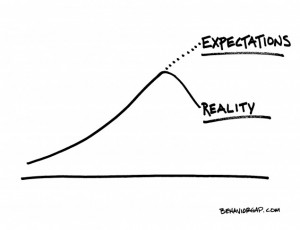 Here’s an article about some guy who’s lost his house: http://www.consumerismcommentary.com/the-financial-planner-who-lost-his-house/
Here’s an article about some guy who’s lost his house: http://www.consumerismcommentary.com/the-financial-planner-who-lost-his-house/
Sad, yes, you say … but, not to be rude, you also say … so have hundreds of thousands of others during this global financial crisis 🙁
But, if you look closely, you’ll see a small difference between this guy and the rest: this guy should have known better.
You see, he’s a financial advisor …
… and, not just any financial advisor, he’s a New York Times financial columnist/blogger!
What’s even more interesting is that he’s prepared to use his own tale of woe (as is Consumerism Commentary in his follow up piece to the original NYT article):
to explain how people continue to behave irrationally about money even when they know better. It’s a good indication of why a healthy approach to your finances requires much more than knowing, “spend less than you earn.” We’d like to think that building wealth is as simple as that, but if that were true, anyone who could do simple arithmetic would be financially secure over time.
Hello?!
Doesn’t anybody see what’s really wrong with this picture?
Consumerism Commentary tells us:
Carl Richards is one of today’s best writers focusing on personal finance
This is after Carl admitted to the world that he lost his house because he “behaved irrationally about money” …
If the BEST financial advisors can lose their houses … how have the average ones mismanaged their’s … and, how badly can the worst ones screw up your life?
And, would you have known about Carl’s screw-up if he didn’t come forward and tell us?
Who are you seeking financial advice from? And, how can you really be sure … ? 😉





At least he is being up front about how he messed up. I suppose that says something positive about his integrity (as well as something negative about his competence).
Personally, I’d much rather take financial advice from people with a better track record…but only after I’ve done my own thinking – nobody cares about my money as much as I do (possibly excepting tax collectors). Put differently, advisers are useful for (i) providing information (ii) doing things you can’t do or don’t want to do (iii) sanity checking. They are not there to replace the responsibility for making your own decisions.
@ traineeinvestor – after this (actually, well before this), I could be excused for striking a line through your (iii).
I see ALL advisors as purely technical: i.e. your (i) and possibly your (ii) BUT only if that merely means pulling certain levers that you decided needed pulling (but not ones that you asked “should I pull this lever”?)
Hi Adrian
By sanity checking, I am usually asking the adviser to tell me if I am about to do something really really stupid or just talking through an investment with them – I’d like to think I don’t need this but I’m human and as prone to errors of judgement as the next person. Just talking things through can be a good way to identify issues.
Maybe this is more of a mentor than an adviser? Or does that take us into the realms of a debate on semantics? 🙂
Cheers
traineeinvestor
@ traineeinvestor – Exactly: You need a “buy me a cup of coffee” mentor not a paid advisor … no semantic issues there 😉
How can you be sure.
Well, that’s really the problem, isn’t it?
I mean, how do we know that AJC really made 7m7y. Maybe he’s building a following to sell his book – and then he’ll make 7million, he hopes.
What I do is i often forward AJC’s posts to a friend of mine – who is a multi-millionaire (who still works full time because he loves his job). And I ask his opinion.
Most of the time he agrees. (and he doesn’t charge 🙂
So my thinking is that even if AJC is a fake, his advice seems sound.
@ Ashton – Buy that man a cup of coffee!
I saw Carl’s article and was very disappointed because I had read a lot of his articles and thought they were pretty good.
I would have had more respect for him if he claimed he knew what he was doing but got too greedy and over leveraged and incorrectly timed the market.
-Rick
@ Rick – that’s what surprised me: nobody (other than you or I) seem to be disappointed in Carl.
Pingback: Who do you Take Personal Financial Advice From? | The End of Poverty … Is the Beginning of Abundance
I have different sorts of financial advisors for different things.Some I use for doing routine leg work, form filling etc;just save some time and energy.Another sort of advisor I use are tax or liason work experts who can do stuff for me that I can’t do for myself.Then there are people who deal in investment vehicles I have no experience of.I merely use talks with them as a way to get to know more for the future.
I am more hands on with regards to my goals and financial plans. I make them myself and prefer to continue doing so myself.I am somewhat eccentric and contrarian in my investments and have made money following my instincts.I dislike paying to hear conventional financial drivel.I believe that the way to really make money is to grasp the finer nuances and I have not yet found an expert willing to waste time on details.
The best financial advice I have got is really from observing and talking to people who have succeeded greatly using some or other investment vehicle in a given asset class.I like to go by their life long experience,work out some sort of superior average returns for the long term and then tune out the experts.